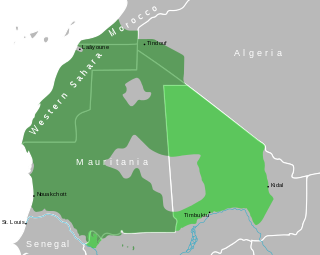This article needs additional citations for verification. (July 2024) |
| Hassaniya | |
|---|---|
| Mauritanian Arabic | |
| حسانية (Ḥassānīya) | |
| Native to | Southwestern Algeria, Northwestern Mali, Mauritania, southern Morocco, Northern Niger, Western Sahara |
| Ethnicity | |
| Speakers | 5.2 million (2014–2021)[1] |
| Dialects | |
| Arabic alphabet, Latin alphabet (in Senegal) | |
| Official status | |
Official language in | |
Recognised minority language in | |
| Language codes | |
| ISO 639-3 | mey |
| Glottolog | hass1238 |
 Current distribution of the Hassaniya language. | |
Hassaniya Arabic (Arabic: حسانية, romanized: Ḥassānīya; also known as Hassaniyya, Klem El Bithan, Hassani, Hassaniya, and Maure) is a variety of Maghrebi Arabic spoken by Mauritanian and Malian Arabs and the Sahrawi people. It was spoken by the Beni Ḥassān Bedouin tribes of Yemeni origin who extended their authority over most of Mauritania and Western Sahara between the 15th and 17th centuries. Hassaniya Arabic was the language spoken in the pre-modern region around Chinguetti.
The language has completely replaced the Berber languages that were originally spoken in this region. Although clearly a western dialect, Hassānīya is relatively distant from other Maghrebi variants of Arabic. Its geographical location exposed it to influence from Zenaga-Berber and Pulaar. There are several dialects of Hassaniya, which differ primarily phonetically. There are still traces of South Arabian in Hassaniya Arabic spoken between Rio de Oro and Timbuktu, according to G. S. Colin.[4]
Today, Hassaniya Arabic is spoken in Algeria, Morocco, Mauritania, Guinea-Bissau, Mali, Niger, Senegal and the Western Sahara.
- ^ Hassaniya at Ethnologue (27th ed., 2024)

- ^ "JOURNAL OFFICIEL DE LA REPUBLIQUE DU MALI SECRETARIAT GENERAL DU GOUVERNEMENT - DECRET N°2023-0401/PT-RM DU 22 JUILLET 2023 PORTANT PROMULGATION DE LA CONSTITUTION" (PDF). sgg-mali.ml. 22 July 2023. Retrieved 26 July 2023.
Article 31 : Les langues nationales sont les langues officielles du Mali.
- ^ "Morocco 2011 Constitution, Article 5". www.constituteproject.org. Retrieved 2021-07-18.
- ^ Norris, H. T. (1962). "Yemenis in the Western Sahara". The Journal of African History. 3 (2): 317–322. doi:10.1017/S0021853700003194. ISSN 0021-8537. JSTOR 179754.